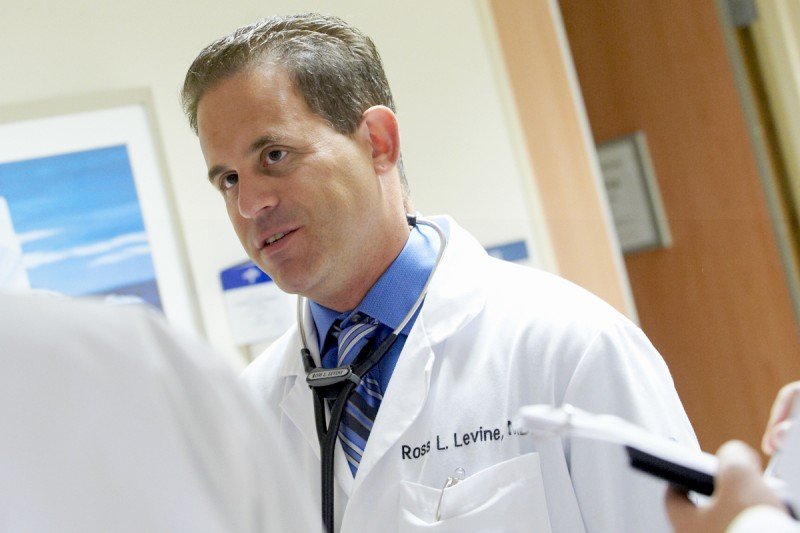
Physician-scientist Ross Levine
A new diagnostic test that identifies genetic alterations in blood cancers will enable physicians to match patients with the best treatments for leukemias, lymphomas, and myelomas. Co-developed by Memorial Sloan Kettering and cancer genomics company Foundation Medicine, the test analyzes samples from patients with the blood diseases and provides information about hundreds of genes known to be associated with these disorders.
The genetic profile will help physicians make more-accurate prognoses and also guide them in treatment recommendations — from deciding whether to take an intensive approach with existing drugs such as chemotherapy to enrolling patients in clinical trials investigating novel therapies. The new test is produced commercially by Foundation Medicine and is expected to be available by the end of this year.
Medical oncologist Ross Levine, who led research at Memorial Sloan Kettering contributing to the development of the test along with physician-scientists Marcel van den Brink, Ahmet Dogan, and Scott Armstrong, presented results demonstrating its accuracy today at the annual meeting of the American Society of Hematology in New Orleans.
A Tool with Broad Impact
The test will play an essential role in the clinical care of most patients with blood disorders at Memorial Sloan Kettering and, it is expected, in the care of patients throughout the United States. According to the Leukemia and Lymphoma Society, an estimated 1.1 million people in the nation are currently living with, or in remission from, leukemia, lymphoma, and myeloma, and an estimated combined total of more than 148,000 will be diagnosed with one of these diseases in 2013.
“Our hope is that this test becomes available to all patients in the country with these malignancies,” Dr. Levine says. “We were particularly excited that we weren’t just developing a tool for the relatively small number of people who are treated at our institution, but providing access to state-of-the-art cancer genomics more broadly.”
The diagnostic test was developed and validated using more than 400 samples from Memorial Sloan Kettering patients with the three blood disorders. Dr. Levine explains that it is far more comprehensive than existing tests, which focus on a small number of genetic mutations associated with specific blood cancer types. The new test analyzes more than 400 cancer-related genes, and unlike most standard tests, it looks for alterations in both DNA and RNA.
Sequencing RNA along with DNA is especially useful in the detection of certain kinds of genetic alterations that commonly occur in blood cancers. These include translocations (which occur when pieces of DNA are exchanged between two chromosomes) and fusion genes (new genes that include parts of two different genes). In addition to improving the treatment of patients, Memorial Sloan Kettering will use information gleaned from the test to further advance research into blood cancers.
Back to topClinically Relevant Mutations
Dr. Levine explains that Memorial Sloan Kettering researchers worked with Massachusetts-based Foundation Medicine to annotate, or define, every gene in the panel to correlate it with clinical data and to provide insight into how this information can be used to guide clinical decision making.
“What’s vital about the test is that it’s not just reporting the presence of specific alterations but also indicating how a particular genetic event detected in a patient can guide either prognosis or therapy,” he says. “We identified clinically relevant mutations that were not found using standard tests. These mutations are ‘actionable,’ meaning that targeting them can change the course of the disease, including directing patients to innovative clinical trials.”
Initially, the goal for the test is to produce the full genetic profile from a patient sample within three to four weeks. “With the exception of someone who has very acute leukemia that requires immediate treatment decisions, this test is going to be valuable in clinical care,” Dr. Levine says.
Back to top

